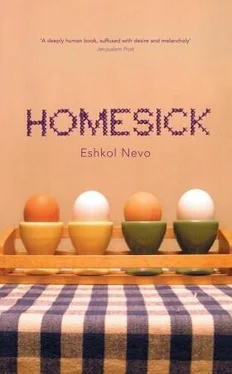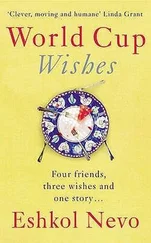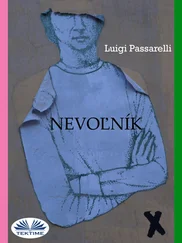Eshkol Nevo - Homesick
Здесь есть возможность читать онлайн «Eshkol Nevo - Homesick» весь текст электронной книги совершенно бесплатно (целиком полную версию без сокращений). В некоторых случаях можно слушать аудио, скачать через торрент в формате fb2 и присутствует краткое содержание. Год выпуска: 0101, ISBN: 0101, Издательство: Random House, Жанр: Современная проза, на английском языке. Описание произведения, (предисловие) а так же отзывы посетителей доступны на портале библиотеки ЛибКат.
- Название:Homesick
- Автор:
- Издательство:Random House
- Жанр:
- Год:0101
- ISBN:9781448180370
- Рейтинг книги:5 / 5. Голосов: 1
-
Избранное:Добавить в избранное
- Отзывы:
-
Ваша оценка:
- 100
- 1
- 2
- 3
- 4
- 5
Homesick: краткое содержание, описание и аннотация
Предлагаем к чтению аннотацию, описание, краткое содержание или предисловие (зависит от того, что написал сам автор книги «Homesick»). Если вы не нашли необходимую информацию о книге — напишите в комментариях, мы постараемся отыскать её.
Homesick
Homesick — читать онлайн бесплатно полную книгу (весь текст) целиком
Ниже представлен текст книги, разбитый по страницам. Система сохранения места последней прочитанной страницы, позволяет с удобством читать онлайн бесплатно книгу «Homesick», без необходимости каждый раз заново искать на чём Вы остановились. Поставьте закладку, и сможете в любой момент перейти на страницу, на которой закончили чтение.
Интервал:
Закладка:
I look at the picture again. I took it from above, from the stone rim of the small pool. Amir was just getting out of the water, leaning on his arms to lift himself up. That’s when I clicked the shutter. His tennis muscles — he hasn’t played since Modi went away, but he still has the muscles — were almost bursting out of his arms (an impressive sight, even though I’m not crazy about bodybuilders), the two mounds of his chest were glistening, I really felt like resting my head on it, and for some reason, his uncombed hair had fallen over to the right. He had some white hair even then, but you can’t see it here because it’s wet. Two large drops are dripping down his forehead. There’s another on his eyelash, and he looks surprised, a tiny bit mocking, Noa, Noa, taking pictures again? The light is marvellous, the soft light of early November, the sun is dancing on the water, illuminating his face just right.
And also the face of the Arab boy sitting in his underpants on the far edge of the pool dangling his legs in the water.
Maybe this is where the inkling I am looking for is hidden, in that boy’s face. Even though he’s only background, seemingly random, he’s looking at the camera with a pretty serious and angry expression on his face. His eyebrows are contracted, his lips are pressed together in the kind of expression older boys usually have, and if you look carefully, you can see that his right foot is half-way out of the water, getting ready for a kick that would only collide with air, but is aimed — or at least looks like it is — at the camera. Maybe what happened in the square a couple of days before had put up the wall of fear again and that boy, even if he doesn’t understand the whole meaning, senses it somehow. Maybe his parents, or his grandparents, lived in the Arab village of Sataf, whose inhabitants were uprooted in ’48, and during this nostalgic trip to the springs they decided to tell the boy who it was that kicked them out of here.
Hey, come on. Enough. It’s obvious that you’ve been spending too much time in Bezalel, Noa. Are you starting to be a phoney intellectual too? Just a few minutes ago, that boy asked for a sip of your Coke, and when you handed it to him, he said thanks a lot and gave you a nice big smile. What’s the connection between the assassination and the Arabs? It’d be better to admit that there are no inklings in the picture. Or maybe there are and you’ll be able to see them in retrospect. That happens sometimes too: you look at a picture you’ve seen a thousand times before, and suddenly a new detail jumps out at you. That’s how my best project last year was born. I was looking at pictures of my family, and all of a sudden, I noticed a puddle of water on the edge of one of them. That picture had been taken in the summer — you couldn’t mistake the burning light of an Israeli summer — but the puddle was as large as a winter puddle. In the middle of August, I started looking for puddles in Tel Aviv and the surrounding towns. In car parks. In industrial areas. In the back yards of grocery shops. It was amazing how many I found. I took pictures of them with almost romantic lighting, as if I were photographing a Norwegian fiord, and I chose an angle that made the puddle look bigger than it was. I called the project ‘Summer Puddles’, and the lecturer stopped the lesson in the middle, told everyone to stay in their seats and ran to get the head of the department, because ‘this is something he has to see’.
On the way back from Sataf, Amir and I argued. A lively debate whose words got all tangled up and somehow turned into a bitter argument. It all started when I said I was sick and tired of living here, in this puddle that drowns its inhabitants, that it looked to me as if things would get very bad now and that I’d started thinking about doing a Master’s in art abroad in New York, say. Amir said that the States wasn’t such a bargain, he’d already lived in Detroit with his parents and they put too much ice in their Coke, and when you go to play basketball at the YMCA, there are ten people standing there and each one takes a shot into a separate basket, and besides, he’s sick of moving; but I insisted, reminding him of Modi’s letter from South America, the one he’d read to me the day before, and I said don’t you feel like getting away for a little while, to sit and look at old Indian ladies all day? He snorted disdainfully and said in an all-knowing tone, bullshit, you take yourself with you everywhere you go, and he turned up the radio to signal that he wanted to end the discussion, and, slightly annoyed, I said, hey, aren’t you tired of those sad songs, for example? He said, no! and turned the volume up even higher and locked himself up inside himself like a steel car lock, I could actually hear the click, but I didn’t know what to say to soften him up, because I didn’t really understand what had hardened him like that. The minute we got home, he escaped into his fat books, and even though I followed him and said, when we finally have a free day after so long, it’s a shame we have to waste it fighting, even then he wouldn’t make up, didn’t even turn his head towards me. So I went into the living room and looked at the picture I hate, the one with the sad man, and prayed that Amir would argue with me, that he’d get up and shout, because I can’t stand it when someone’s cold to me like that, and I turned on the TV and turned it off. All of a sudden, our whole apartment seemed too small, too cramped, and my mouth filled with the taste of defeat and I felt that it wouldn’t work, that the whole idea of living together would end in tears and I’d screw up my final project on the way. I went outside for some air, to calm down, but it was so cold that I ran back in, and inside, no one was waiting for me, except for the man in the picture who, just like before, kept looking outside through the window.
*
In eight years we never had a fight, Moshe and me. Not since we met. Maybe we would’ve kept going and broken the Guinness world record if the car with the megaphone hadn’t come down the street inviting the people who lived in the neighbourhood to a rally with the great rabbi, with a performance by the singer Bennie Elbaz, in the square in front of Doga’s shop.
We were sitting in the living room watching Wheel of Fortune with Erez Tal and Ruth Gonzales, and things were really peaceful. We hadn’t voted for her in the contest, but she was adorable on that programme, with her curls and her accent. She looks good, that Gonzales, I said to Moshe, and he said, yes, but not like you, and gave me a kiss on the shoulder, and I said, you’re a riot, not everyone has to compare with me, but inside, I was glad he still said that, even though I have given birth twice, and my hips have spread and my hair doesn’t shine much any more, like they say in the adverts, and I even have some small wrinkles around my eyes when I laugh. I stroked the back of his neck as a reward, and I combed Liron’s hair with the fingers of my other hand. He was sitting on my left and reading the letters on the screen out loud to show that he already knew the whole alphabet by heart, even though he got confused sometimes between letters that look alike. Lilach was awake, but quiet, completely hypnotised by the TV. The students weren’t making noise with their music. Avram and Gina didn’t come to the door with biscuits. No one called from one of those polling companies to ask what our political position is after the assassination (ever since that time I said I’d answer their questions, they never leave us alone). There was a bowl in the middle of the table with two bunches of grapes in it, black and green. Every once in a while, someone took a grape.
When you’re living your everyday life, you don’t think about the good things you have. You’re almost always too busy thinking about what you don’t have. But right then, I remember thinking: look at how beautiful this is, Sima. You have your small family. A whole family, like you dreamed you’d have when you were a girl. And then, just when an engineer from Yavneh won a refrigerator worth four thousand shekels, the sound of the megaphone broke into the victory music. What’s the junkman doing here now? I muttered, still full of the pleasant feeling my thoughts were giving me, and Moshe turned down the sound on the TV and said, that’s not the junkman, Sima, listen. ‘All neighbourhood residents are invited! Bennie Elbaz, in the square in front of Doga!’ the megaphone shouted. And Moshe filled in the rest: there’s a big rally, the whole neighbourhood’s going. The great rabbi will be there, and all the heads of the movement. It’s going to be something special. Terrific, I said, grabbed the remote control and made the TV louder. The engineer from Yavneh also won two plane tickets to London and a chance to be in the finals. Wanna go? Moshe asked. Why, what do I want with them? I answered. We were both looking at the TV, we didn’t dare look at each other. Then, all of a sudden, he got up from the sofa so fast that I couldn’t believe it was him, stood in front of me and blocked the screen. I don’t understand you, Sima. It wouldn’t hurt us to listen to some Torah. To learn a little Judaism. It’s far better than sitting here and watching this rubbish on TV. Daddy, Liron said, jumping up, I want to go to the rally with you. Absolutely not, I cut in before Moshe had time to agree. It’s late and you have to go to sleep. I don’t know why you don’t have your pyjamas on yet. Brush your teeth, put on your pyjamas, and go to bed. Get a move on. Liron walked to his room, but didn’t hide how much he didn’t want to. Move please, you’re blocking the screen, I told Moshe. He moved aside slowly, on purpose. The megaphone, which had already moved away from our street, was coming back. This time, not only music was coming from it. OK, I’m going anyway, Moshe said, looking at me expectantly. I didn’t say anything. And when I get back, he added in that same puffed-up tone that his brother Menachem uses, I want to talk to you. And if you don’t come home, my dear husband, should I go and look for you in Bnei Brak? I asked without taking my eyes off the TV. Yes, in Bnei Brak, Moshe repeated just to annoy me, and then he put on his warm jacket, went out and slammed the door.
Читать дальшеИнтервал:
Закладка:
Похожие книги на «Homesick»
Представляем Вашему вниманию похожие книги на «Homesick» списком для выбора. Мы отобрали схожую по названию и смыслу литературу в надежде предоставить читателям больше вариантов отыскать новые, интересные, ещё непрочитанные произведения.
Обсуждение, отзывы о книге «Homesick» и просто собственные мнения читателей. Оставьте ваши комментарии, напишите, что Вы думаете о произведении, его смысле или главных героях. Укажите что конкретно понравилось, а что нет, и почему Вы так считаете.












